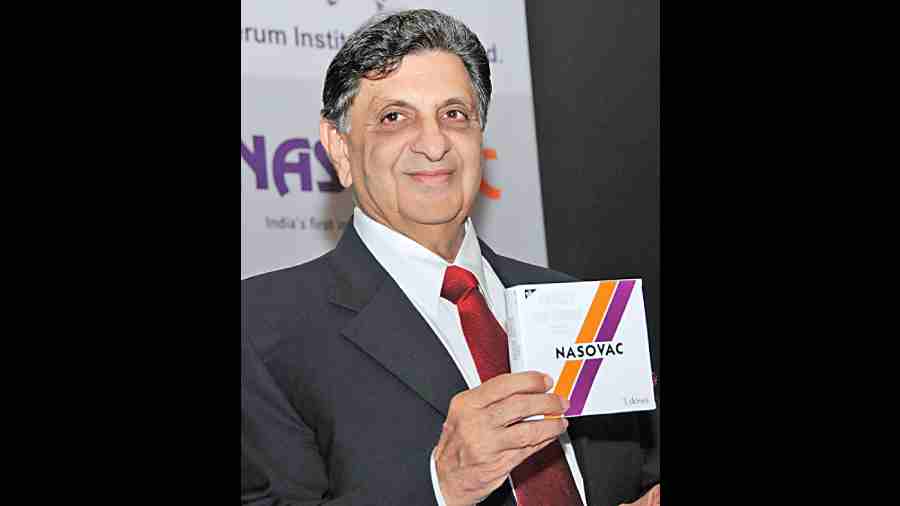Courageous work
ADVERTISEMENT
- The nomination and selection process for the Nobel Peace Prize is shrouded in secrecy. But Cyrus Poonawalla, the founder of the Serum Institute of India, is considered by many to be a strong candidate. Last week, the Indian high commissioner in London, Gaitri Issar Kumar, threw a party to celebrate his Padma Bhushan and recognise his firm’s contribution in supplying vaccines to the world. Poonawalla founded the SII — currently the world’s biggest vaccine manufacturer — in 1966. The firm is now run by his son, Adar Poonawalla. In 2019, the senior Poonawalla was given an honorary degree by Oxford University, where the firm is funding a £50 million building for research on vaccines. In order to save time, the SII made 200 million doses of the AstraZeneca/Oxford Covid-19 vaccine “at risk” even before it was authorised for use by health authorities. It provided five million doses to the United Kingdom, one of which was given to Boris Johnson, I am informed by Lord Karan Bilimoria, the president of the Confederation of British Industry, who helped the high commissioner organise the event. Bilimoria spoke of “the amazing work Cyrus has done in providing affordable vaccines to the developing world... he has saved at least 30 million lives as a result of his affordable vaccines over the years, let alone the lives that he has saved through the pandemic.” Bilimoria went back in history to Cyrus the Great, adding, “2,500 years later we have our own Cyrus the Great.”
Pages of history
- The BBC asked a panel of academics, booksellers and librarians from the Commonwealth countries to pick 70 books to represent the 70 years of Queen Elizabeth II’s reign with 10 novels from each decade. It says that the list “offers brilliant, beautiful and thrilling writing produced by authors from a wide range of Commonwealth countries”. Some books caught my attention. For example, between 1952- 1961: The Guide by RK Narayan (India); To Sir, With Love by ER Braithwaite (Guyana); A House for Mr Biswas by VS Naipaul (Trinidad and Tobago/England), and Sunlight on a Broken Column by Attia Hosain (India). Between 1972-1981: Salman Rushdie’s Midnight’s Children (England/India); 1992-2001: A Fine Balance by Rohinton Mistry (India/ Canada); The God of Small Things by Arundhati Roy (India); and Life of Pi by Yann Martel (Canada); 2002-2011: Chinaman by Shehan Karunatilaka (Sri Lanka). The book, Arrow of God, by Chinua Achebe (1964, Nigeria) is on the list, though I prefer his debut novel, Things Fall Apart, which was published in 1958. One of my favourite novels, A Suitable Boy by Vikram Seth, published in 1993, is not on the list.
Treasured items
- There are books on decluttering, but the art of getting rid of old newspapers is one that I don’t think I will ever master. I have to stop and go through the clippings as well as entire newspapers and magazines from the past because they are so interesting. I threw away and then retrieved a copy of Hello! marking Elizabeth Hurley and Arun Nayar’s “magnificent Hindu wedding in India”. I found a sympathetic interview Boris Johnson had done in 1998 with Kamlesh Bahl, the first Asian woman to become vice-president of the Law Society. I have many clippings from September 1995 on Hindu Gods drinking milk in temples. The Times reported: “Senior Indian journalists wrote personal accounts of visiting temples to debunk the ‘miracle’ and came out ‘amazed and humbled’.” I had a piece in The Sunday Telegraph, written with Victoria Coombe, which ended: “In India, the Vishwa Hindu Parishad said in a statement: ‘The miracle has clearly demonstrated that the 21st century will be the century of Hinduism.’” The psychiatrist, Dr Raj Persaud, an agnostic, told us: “The real point is not whether miracles are occurring. It’s that the event has shown the power of religion.” I wish there was a South Asian library in London so that I did not have to consign all this to the bin. Clippings are so much more accessible than Google.
Costly meal
- The next time I am in Birmingham I will have to try out Varanasi, the Indian restaurant which Johnny Depp booked for 20 guests after winning the court case against his former wife, Amber Heard. The bill, apparently, came to £50,000. Starters included shish kebab, chicken tikka and tandoori king prawns, while the main course had butter chicken, paneer tikka masala, lamb karahi and king prawn bhuna. But £2,500 per head still seems unlikely.
Footnote
- The magazine, Private Eye, celebrated “70 Glorious Years” of the Queen of England, Elizabeth II, with a picture of the prime minister, Boris Johnson, conversing with the monarch. “I can’t believe you’ve survived so long,” Her Majesty, who has just passed her Platinum Jubilee, tells her 14th prime minister.










